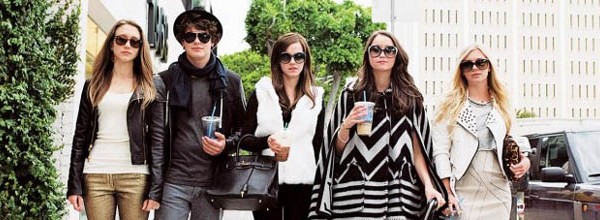Based on a Vanity Fair article detailing the wanton theftage exploits of a group of bored rich-kids, Coppola initially depicts their activities without judgement. The camera work is unshowy, but effective, the script full of well-observed banalities. In the midst of the hard to like characters and conspicuous consumption it might go unnoticed that this is a very well-made movie.
We are introduced to the teenagers’ day-to-day lives of excess, partying and soul-crushing boredom. The only parent we really meet is Leslie Mann’s Laurie (mother to Sam, Nicki and Emily), a ditz who has given her life over to the teachings of Rhonda Byrne. This is the first of many scenes of crisp, white glossy homesteads, sunlight pouring in from huge windows, wardrobes pouring out shoes like Sex and the City discovering dimensional transcendentalism.
Pursuing the superfluous is one of many aspects of this lifestyle that breeds recursion, the characters largely motivated by increasing their vast supplies of Stuff. Their distance and deadpan utterances of the appalling manage to tiptoe the borderline between humour and horror.
Into this world comes Marc, an awkward boy who can’t believe his luck at being befriended by Rebecca (Rachel Chang) on his first day of school, swept up into her life of crimes-on-a-whim and unwilling to jeopardise it by stating his many qualms. After raiding a house of another pupil, they find easy access to money, clothes and cars. The next step is finding out that Paris Hilton is at a social event at the weekend, establishing her address via Google, and then raiding the property. Reporting back to their friends, things escalate as they repeat the process on other houses.
The Bling Ring isn’t a traditional narrative. It is more like the aforementioned Grand Theft Auto – a series of episodic crimes, punctuated by parties and reckless, unhinged nihilism. The lack of sympathy or empathy is brought home in several brutal scenes, notably Chloe (Claire Julien – Wally Phister’s daughter) reacting to near-death like it’s just another lulz-source; the film is alternately bleak and hilarious. The only ones who seems to care about how they come across are Emma Watson’s Nicki, and Israel Broussard’s Marc.
Many of the cast are newcomers, and mainly seem effortlessly natural, though Watson seizes the plum role of the group, making the most of the script’s best lines and creating a vainglorious monster, entirely driven by her desire to attain fame. If a groupie came up to her and said that they had carpal tunnel syndrome, she’d probably shake them vigorously by the hand. It’s a great choice of role for Watson, distinctive from her previous roles, and suggesting that there’s more to come from her. Broussard is a relative newcomer, but his performance of wide-eyed enthusiasm, tempered by genuine fear of the possible repercussions, ensures the audience’s sympathy is with Marc.
After the episodic, reckless crime spree comes the inevitable. It’s here that the film makes two moral observations. One, somewhat clunky, where Marc speaks to a journalist about his experiences, feels like it might have been taken verbatim from real life. It’s a shame that it detracts from Marc being led away to the prison bus in orange coveralls, more alone than he was at the start of the film, his illusions shattered. Better still is the final scene, where Nicki is interviewed after a suspended jail term.
She has idolised those who are famous for being famous. Now she is famous for stealing from those people. It begs the question: where the hell does this all end?
![]()
Released in UK cinemas on Friday 5 July 2013.

